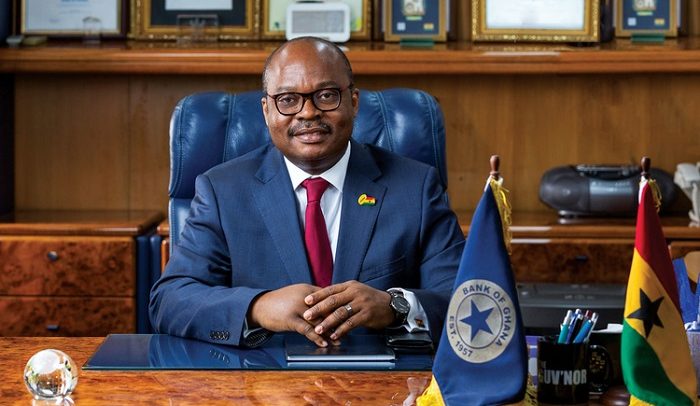BoG Govenor, Dr Ernest Addison
The International Monetary Fund (IMF) has asked the Bank of Ghana to uphold its policy mandates despite the financial setback experienced in the fiscal year ending 2022.
According to the IMF, it remains important for the BoG to take decisive measures to reduce inflation back to its designated target of 8 percent.
“The loss the BoG incurred in the process has contributed to reducing its net equity to a negative value. Importantly, however, this does not prevent the BoG from fulfilling its policy mandates and ensuring inflation gradually returns towards its 8-percent target”, the IMF said in a release yesterday.
The IMF, however, backed the BoG’s GHS 60 billion loss saying the impairment which was brought on by the government’s Domestic Debt Exchange (DDE) was necessary to “restore macroeconomic stability and public sustainability.”
The IMF asserted that the BoG’s participation in the DDE was to share some of the burden the DDE places on government debt holders, along with banks, other financial institutions, pension funds and individuals.
The IMF thus anticipates that the central bank’s income will be adequate to cover the costs associated with monetary policy.
“The BoG’s net equity is expected to improve significantly over time and eventually return to positive territory”, the IMF concluded.
The Bank of Ghana incurred the loss largely as a result of the government’s Domestic Exchange Programme (DDEP) after its non-marketable holdings of the government of Ghana instruments including long-term stocks, a COVID-19 Bond, and overdraft were subjected to a 50 per cent haircut.
Also, the Bank’s other claims (holdings of marketable instruments) were exchanged under similar terms as other financial institutions under the DDEP, leading to the impairment.
In addition, the Bank incurred revaluation losses on its foreign assets and liabilities due to exchange rate depreciation, leading to a total loss of GH¢55.12bn equity in 2022.
The Central Bank has said, it had to ‘take the hit’ to salvage the economy but this explanation has not satisfied industry players who blame the Bank of Ghana for fiscal irresponsibility and unsound practices – a claim the Bank has vehemently refuted.
Meanwhile, some financial analysts have raised questions about the Bank of Ghana’s continuous attribution of its to the domestic debt exchange.
For them, this explanation is insufficient and should undergo thorough scrutiny.
The Bank of Ghana has countered allegations of insolvency and bankruptcy by asserting that it remains fiscally sound despite the impairment.
The Bank emphasizes that it is a non-commercial entity, and its financial results do not impact on its operational capabilities.
But sector players insist that the argument of the Central Bank is untenable.
By Jamila Akweley Okertchiri


